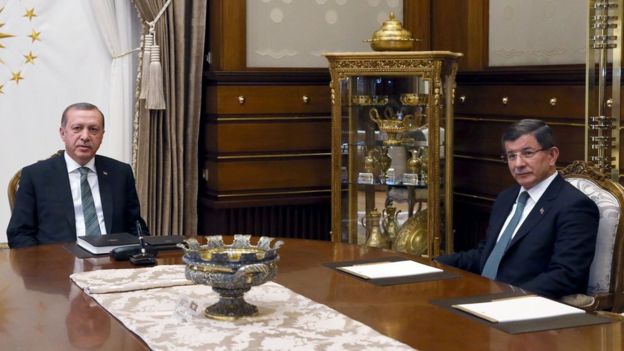Why Did The Turkish Prime Minister Resign?

NEW DELHI: Turkey's Prime Minister Ahmet Davutoglu announced that he will stand down at an extraordinary congress of his ruling AK Party later this month.
In a highly sensitive and precarious West Asia, leaders have long been the protagonists, playing with power and political maneuvering. But often times, a resignation by a powerful leader have several hidden layers of interpretation, which generally go unnoticed. In league of this trend, the resignation of the Turkish Prime Minister Ahmet Davutoglu is quite unfathomable. A lot of speculation is surrounding it, especially because President Recep Tayyip Erdogan has himself hand-picked the PM and for once, they both represented the strongest political alliance in West Asia.
So, what changed it and suddenly caused this rift?
Davutoglu recently announced that he would step down as the AK Party leader at an extraordinary congress which would be organized on May 22nd. So, what would this extreme step mean for Turkey’s democracy?
To start with, the growing rift between the two political leaders became apparent when the Prime Minister gave a lukewarm response to Erdogan’s growing presidential power. Also, he was not in tandem with Turkey’s position against the Kurdish rebels. He also gave opposing statements to the public on the topic of detaining government critics.
Ozgur Ozdamar, the Professor of International Relations at Bilkent University stated that that the resignation was something which the political analysts and media pundits had been expecting for some time now. Though, they did not know how and when it would take place. He opines that the PM did not actually resign but he was forced out of his position.
Sinan Ulgen, the Visiting scholar at Carnegie Europe stated that now there would be a short-term uncertainty in Turkish politics on who would be now the replacement. There are numerous leading contenders for the position as of now. But the uncertainty will be erased when the ruling party would hold its extraordinary convention on May 22nd. After that, the pertinent question would be the structure of the new cabinet because this is going to dictate Turkey’s both political and economic position. There is a growing rift on how should Turkey follows its monetary policy, whether it should cut down on interest rates or should it be more towards pro-reform agenda. Thus, the new Cabinet would also help in creating a sound foreign policy, especially with Europe when a deal is in making, especially taking into consideration the prominent refugee crisis.
So, anyway, the resignation states that Erdogan is the man and politics in Turkey begins and ends with him, a fact that any Prime Minister should flawlessly follow. That was the case in the past and is the case in the present and future of Turkey’s politics. Wolfango Piccoli, the Managing director at Teneo Intelligence states that it is no longer important to debate on who would be the next PM because quite understandably, he would be an Erdogan loyalist whose main work would be to implement the decisions which are taken in the Presidential Palace. But from an investment point of view, what is more important is to know who would take care of the economic portfolios and question if there would be continuity there or not.
The economic condition of Turkey is highly volatile and it would be more interesting to note if there would be extreme changes taking place after the new PM is once again hand-picked. In case, there would be major changes, it would lead to a negative impact to the markets and that’s something Turkey cannot afford right now.
So, as most of the resignations and the truth about them are not unearthed correctly, the same trend would be followed by the resignation of the Turkish PM. Instead of his resignation, it is the economic and monetary policies that are more important as well as the formation of the new cabinet.
(Main photo: Mr Davutoglu had a long meeting with the PM on Wednesday. Photo credit: AFP)



